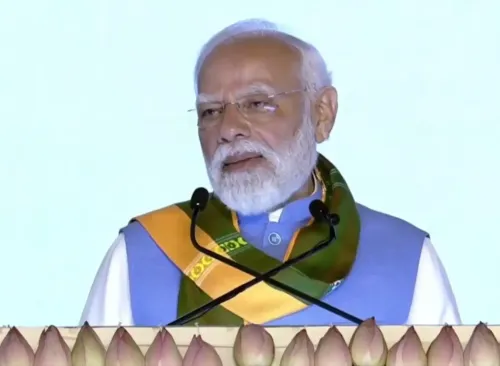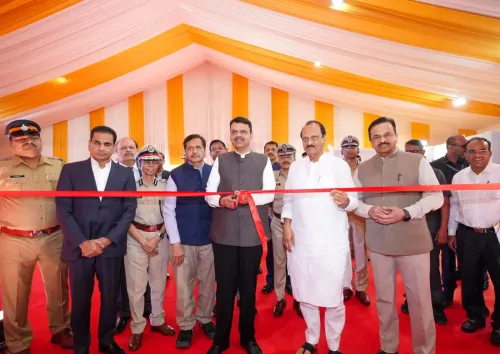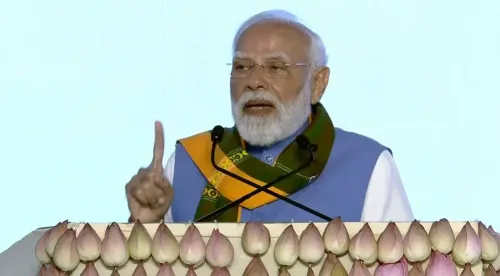How Can Chabahar Port Be Effectively Utilised? Insights from Afghan Minister's Visit to India

Synopsis
Key Takeaways
- Afghan Minister Azizi's visit aims to enhance Chabahar Port's utilization.
- Strengthening trade ties with India is a primary focus.
- Border tensions with Pakistan have prompted Afghanistan to seek alternative trade routes.
- Chabahar Port is pivotal for reducing transport costs.
- Afghanistan aims to position itself as a regional transit hub.
New Delhi/Kabul, Nov 19 (NationPress) The Afghan Minister of Industry and Commerce, Alhaj Nooruddin Azizi, has landed in New Delhi on Wednesday afternoon, marking the commencement of an official visit by a prominent government delegation from Kabul. The primary objective of this visit is to activate and leverage the capabilities of the India-developed Chabahar Port in Iran while also attracting increased investments.
The Ministry of External Affairs (MEA) warmly welcomed the visiting minister and emphasized that the enhancement of bilateral trade and investment relationships is the central theme of Azizi's visit.
Prior to the delegation's arrival in India, Afghanistan's Ministry of Industry and Commerce highlighted that bolstering bilateral trade through the port would be a significant topic of conversation during Azizi's tour.
“During this trip, the Afghan delegation plans to visit the Pragati Maidan International Exhibition and engage with senior officials from the Government of India, including the Ministers of Foreign Affairs and Commerce, as well as traders, investors, and esteemed members of the private sectors of both nations. The objective of these discussions is to enhance economic collaboration, ease trade relations, create joint investment opportunities, and fortify Afghanistan's position in the regional transit routes,” stated a release from the Afghan ministry.
“This visit is considered a crucial step towards strengthening economic and commercial connections between the two nations, and the outcomes are anticipated to significantly improve communication, boost trade, and develop transit pathways,” the statement highlighted, underscoring the necessity to effectively utilize the capabilities of Chabahar Port in Iran.
With rising border tensions with neighboring Pakistan, which have caused substantial losses for traders on both sides of the Durand Line, Kabul is eager to facilitate the transit of goods through Chabahar Port.
Recent reports from Afghan media indicated that in light of increasing tensions between Afghanistan and Pakistan, the ruling Taliban regime aims to explore Chabahar Port's extensive potential, viewing it as a new “opportunity.”
The Afghanistan-Pakistan Joint Chamber of Commerce and Investment reported that due to Pakistan closing border crossings for trade, traders from both nations have collectively endured over $100 million in losses.
The Chamber indicated that the ongoing situation has created uncertainty regarding future trade between the two countries, with both sides facing significant daily losses in transit and commercial activities.
Officials from Afghanistan disclosed to Pajhwok media that Kabul aims to harness the vast potential of Iran's Chabahar Port, which could enhance exports, facilitate transit, and pave the way for Afghanistan to become a regional transit hub.
The Kabul Dry Fruit Exporters Union also mentioned that exports through Chabahar Port are “currently running smoothly, with no issues in shipments to India.”
Mohammadullah Bakhtyar, Director of the Ministry of Commerce and Industry (MoCI), while addressing a meeting on the port's transit potential in Kabul, stressed the importance of utilizing Iran’s transit routes — especially the Chabahar Free Economic Zone. He underscored its strategic significance, noting that it grants Afghanistan access to open seas, according to Pajhwok.
Chabahar Port provides Afghanistan with access to the Persian Gulf and plays a crucial role in not only reducing transport costs but also in enhancing trade with India, the Middle East, Central and South Asia, Africa, Europe, and America.









